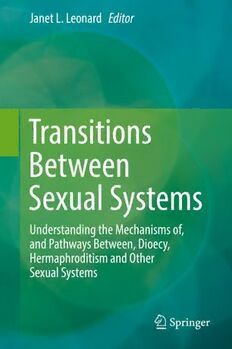
Transitions Between Sexual Systems: Understanding the Mechanisms of, and Pathways Between, Dioecy, Hermaphroditism and Other Sexual Systems PDF
Preview Transitions Between Sexual Systems: Understanding the Mechanisms of, and Pathways Between, Dioecy, Hermaphroditism and Other Sexual Systems
Janet L. Leonard Editor Transitions Between Sexual Systems Understanding the Mechanisms of, and Pathways Between, Dioecy, Hermaphroditism and Other Sexual Systems Transitions Between Sexual Systems Janet L. Leonard Editor Transitions Between Sexual Systems Understanding the Mechanisms of, and Pathways Between, Dioecy, Hermaphroditism and Other Sexual Systems Editor JanetL.Leonard JosephM.LongMarineLaboratory InstituteofMarineSciences UniversityofCalifornia SantaCruz,California,USA ISBN978-3-319-94137-0 ISBN978-3-319-94139-4 (eBook) https://doi.org/10.1007/978-3-319-94139-4 LibraryofCongressControlNumber:2019932836 ©SpringerNatureSwitzerlandAG2018 Thisworkissubjecttocopyright.AllrightsarereservedbythePublisher,whetherthewholeorpart of the material is concerned, specifically the rights of translation, reprinting, reuse of illustrations, recitation,broadcasting,reproductiononmicrofilmsorinanyotherphysicalway,andtransmissionor informationstorageandretrieval,electronicadaptation,computersoftware,orbysimilarordissimilar methodologynowknownorhereafterdeveloped. The use of general descriptive names, registered names, trademarks, service marks, etc. in this publication does not imply, even in the absence of a specific statement, that such names are exempt fromtherelevantprotectivelawsandregulationsandthereforefreeforgeneraluse. Thepublisher,theauthorsandtheeditorsaresafetoassumethattheadviceandinformationinthisbook arebelievedtobetrueandaccurateatthedateofpublication.Neitherthepublishernortheauthorsorthe editorsgiveawarranty,expressorimplied,withrespecttothematerialcontainedhereinorforanyerrors oromissionsthatmayhavebeenmade.Thepublisherremainsneutralwithregardtojurisdictionalclaims inpublishedmapsandinstitutionalaffiliations. ThisSpringerimprintispublishedbytheregisteredcompanySpringerNatureSwitzerlandAG Theregisteredcompanyaddressis:Gewerbestrasse11,6330Cham,Switzerland Tomyhusband,BruceKarsh,withallmylove Preface The stimulus for this book came from Verena Penning of Springer Verlag, who approachedmeaboutdoingabookrelatedtothetopicofasymposium“Phenotypic plasticityandtheevolutionofgender”whichIhadorganizedforthe2013meetingof theSocietyforIntegrativeandComparativeBiologyandwhichwaspublishedthat year in Integrative and Comparative Biology. With her encouragement, I began thinking about whether there were new and unexplored areas in the field, which could be the basis for a useful and groundbreaking book, and I decided there was. Thefocusofthisbookisontaxonomicgroupsthatdemonstratesubstantialdiversity of sexual systems with the goal of understanding what selective pressures are associated with changes in sexual system and what evolutionary pathways and sex-determiningmechanisms areinvolved inchanges insexualsystems whenthey change.GeorgeWilliams(1975),inhisseminalbook,SexandEvolution,(a)pointed outthatsexualsystemsareoftenextremelyconservative,indefianceofthetheoryof theera,and(b)suggestedthatunderstandingwhat factors wereimportant indeter- mining sexual system or evolutionary changes in sexual system would best come from analysis of taxa characterized by lability or diversity in sexual system. This book, then, is an effort to follow Williams’ suggestion by offering an array of chapters, each dedicated to a taxon (or group of taxa) which is variable in sexual system, with a goal of analyzing the selective pressures, evolutionary pathways, and/orsex-determinationmechanismsthatexplainthisdiversity. Whenonebeginstoreviewafield,onealwaysfindsthatitisriddledwithrabbit holes,manyofthemfulloffascinatingfacts,discoveries,andideasthatenrichone’s understanding of evolution and biology (and sometimes also the workings of scientists’ minds), even though this material often proves completely irrelevant to thethemeofthereview.Occasionally,thereisrealtreasuredownoneoftheseholes. Itisprobablyfairtosaythattherearetwotypesofscientists,thosewhoenjoyrabbit holes and those who do not. I happen to enjoy them, perhaps too much, and consequently planning, participating in, and particularly reading the chapters of thisbookhasbeenagreatpleasure.Ihopealltheauthorswhohavecontributedto thisbookhavehadthesameexperience.Itisalsomyferventhopethatreadersofthis vii viii Preface bookwillfindbothanauthoritativesourceforthetopicsinquestionandarichsource ofrabbitholestoexplore. MythankstoVerenaPenning,thewholestaffofSpringerVerlag,andespecially theauthorsofthebook’schapterswhogavetheirtimetomakingthisbookpossible andhavetaughtmesomuchandthemanyreviewerswhohavemadethebookbetter. SantaCruz,CA JanetL.Leonard Contents 1 TheEvolutionofSexualSystemsinAnimals. . . . . . . . . . . . . . . . 1 JanetL.Leonard 2 Phylogeny,Evolution,andEcologyofSexualSystemsAcrossthe LandPlants. . . . . . . . . . . . . . . . . . . . . . . . . . . . . . . . . . . . . . . . 59 AndreaL.CaseandLinleyK.Jesson 3 TransitionsBetweenCombinedandSeparateSexesinFlowering Plants. . . . . . . . . . . . . . . . . . . . . . . . . . . . . . . . . . . . . . . . . . . . . 81 JohnR.Pannell 4 TheEvolutionofUniparentalReproductioninRhabditina Nematodes:PhylogeneticPatterns,DevelopmentalCauses, andSurprisingConsequences. . . . . . . . . . . . . . . . . . . . . . . . . . . 99 EricS.Haag,JohannesHelder,PaulJ.W.Mooijman,DaYin, andShuangHu 5 PolychaeteWormsontheBrinkBetweenHermaphroditism andSeparateSexes. . . . . . . . . . . . . . . . . . . . . . . . . . . . . . . . . . . 123 LauraPicchiandMariaCristinaLorenzi 6 Sex-DeterminingMechanismsinBivalves. . . . . . . . . . . . . . . . . . 165 SophieBreton,CharlotteCapt,DavideGuerra,andDonaldStewart 7 TransitionsinSexualandReproductiveStrategiesAmongthe Caenogastropoda. . . . . . . . . . . . . . . . . . . . . . . . . . . . . . . . . . . . 193 RachelCollin 8 Hermaphrodites,DwarfMales,andFemales:Evolutionary TransitionsofSexualSystemsinBarnacles. . . . . . . . . . . . . . . . . 221 YoichiYusa ix x Contents 9 LifeHistoryConstraintsFacilitatetheEvolutionofAndrodioecy andMaleDwarfing. . . . . . . . . . . . . . . . . . . . . . . . . . . . . . . . . . . 247 SachiYamaguchi 10 SexualSystemsinShrimps(InfraorderCarideaDana,1852),with SpecialReferencetotheHistoricalOriginandAdaptiveValueof ProtandricSimultaneousHermaphroditism. . . . . . . . . . . . . . . . 269 J.AntonioBaeza 11 EnvironmentalandGeneticSexDeterminingMechanismsin Fishes. . . . . . . . . . . . . . . . . . . . . . . . . . . . . . . . . . . . . . . . . . . . . 311 JohnGodwinandReadeRoberts 12 CausesandConsequencesofEvolutionaryTransitionsintheLevel ofPhenotypicPlasticityofReptilianSexDetermination. . . . . . . 345 NicoleValenzuela List of Contributors J. Antonio Baeza Department of Biological Sciences, Clemson University, Clemson,SC,USA SmithsonianMarineStationatFortPierce,FortPierce,FL,USA Departamento de Biologia Marina, Facultad de Ciencias del Mar, Universidad CatólicadelNorte,Larrondo,Coquimbo,Chile SophieBreton DepartmentofBiologicalSciences,UniversitédeMontréal,Montréal, QC,Canada CharlotteCapt DepartmentofBiologicalSciences,UniversitédeMontréal,Montréal, QC,Canada Andrea L.Case DepartmentofBiologicalSciences,KentStateUniversity, Kent, OH,USA RachelCollin SmithsonianTropicalResearchInstitute,BalboaAncon,Panama JohnGodwin DepartmentofBiologicalSciences,NorthCarolinaStateUniversity, Raleigh,NC,USA DavideGuerra DepartmentofBiologicalSciences,UniversitédeMontréal,Montréal, QC,Canada EricS.Haag DepartmentofBiology,UniversityofMaryland,CollegePark,MD, USA JohannesHelder LaboratoryofNematology,Wageningen,TheNetherlands Shuang Hu Department of Biology, University of Maryland, College Park, MD, USA Linley K. Jesson Department of Biology, University of New Brunswick, Freder- icton,NB,Canada xi
